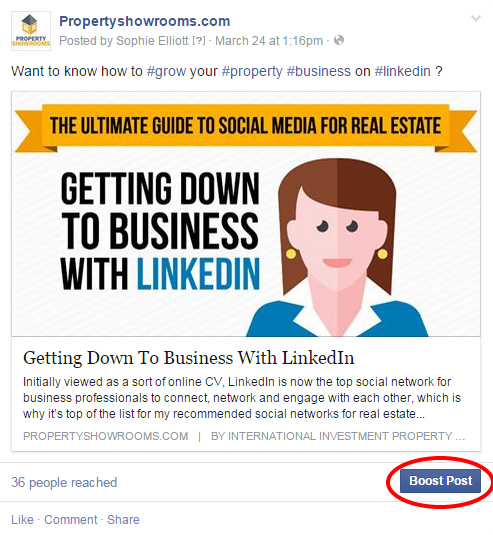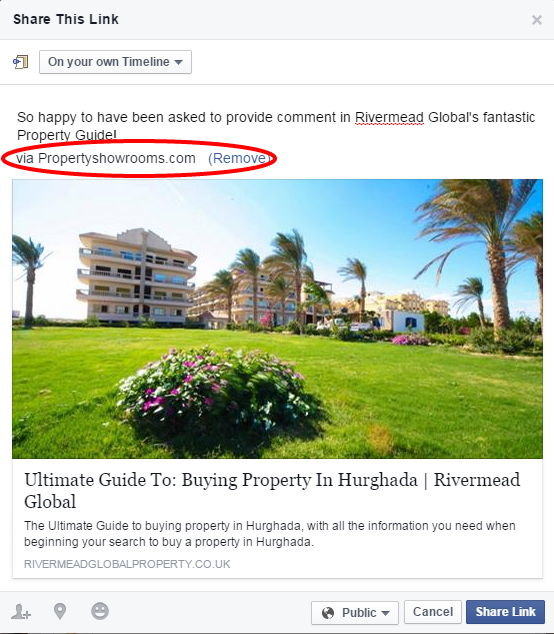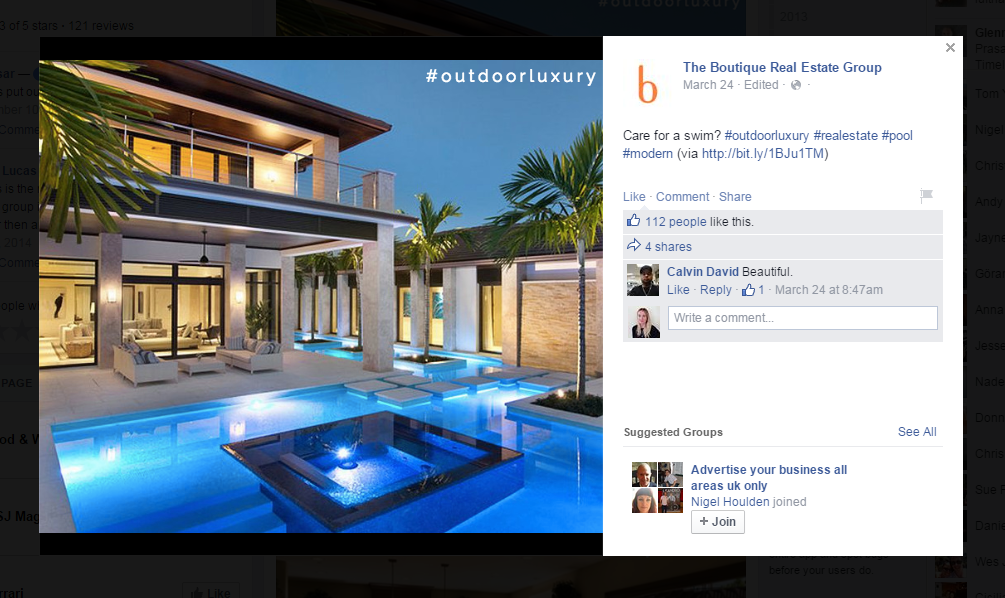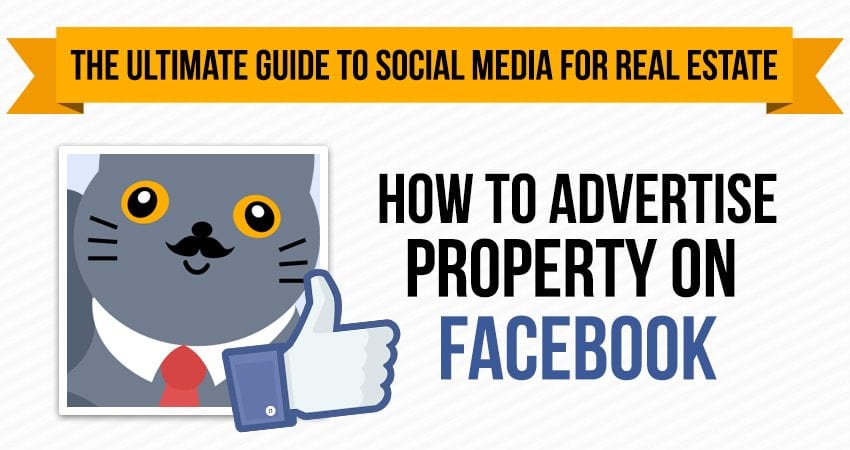How to Advertise Property on Facebook
Facebook is the most popular social networking site in terms of its volume of users; the platform currently has around 1.35 billion monthly active users, which FYI is equivalent to the entire population of China!
So basically Facebook is one of the world’s largest communities in existence and where there’s a large number of people there’s opportunity to market your products. That’s why Facebook is such a popular online marketing platform amongst a number of industries, including real estate.
The only downside to Facebook is that in order to successfully market your real estate business and reach your target audience you have to pay for it.
At this stage you might be questioning my sanity, and thinking “I have a Facebook account and I’ve never paid a penny for it!” Allow me to explain…
You see Facebook used to be a free platform for businesses, but recent developments mean that now in order to reach consumers, you have to not only work, or pay, for people to “like” your business page, but you must also pay to reach those prospects.
If you use Facebook, you may have noticed that pages you’ve liked don’t come up in your feed all that often anymore, that’s because Facebook has more or less completely eliminated organic reach of social posts. What that means is in the past when a business posted content on their page; your fans or prospects would see it in their newsfeed. However now Facebook has put limitations in place and businesses must pay to “promote” posts, or pay for ads on the network in order for others to see your content.

Despite this, if you’re willing to pay, and, really, by advertising standards the cost is relatively low, the targeted reach is fantastic. You can narrowly target your posts or ads to the exact type of person you want to reach. If you’ve ever wondered whether Facebook uses your personal data to its own advantage? Well, this is it. You can target your adverts on Facebook right down to the location, age group and interests of your potential clients.
So without further ado let me show you how, as a real estate agent, you can tap into this market and get your name and listings in front of clients using the world’s largest social networking site.
Step 1:How to set up a Facebook Page
First thing’s first; set up a professional page on Facebook for your real estate business. If you’re completely new to Facebook you’ll need to set up a personal account first.
You could promote your business from your personal account alone but be aware that in choosing to do so you will miss out on a lot of essential business features, like the ability to run Facebook contests, and check Facebook Insights.
Therefore creating a Facebook page whereby you can promote your brand and properties is really worth doing, plus it’s really easy to set up. Here’s how:
- Go to facebook.com/pages/create
- Click to choose a Page category
- Select a more specific category from the dropdown menu and fill out the required information
- Click Get Started and follow the on-screen instructions
Remember that just because your personal profile and professional page are separate it doesn’t mean the two can’t work together. You can still post to your business page using your personal account, or share content you posted on your business account in groups. I would encourage posting as an actual person on your business page, it will help give a personality and put a face to a name.

Right then, now that you have a page, you need to learn how to use it to engage your clients, here’s how:
Step 2: Get active and create content
Post regularly
This may seem like a no-brainer, but many people forget this simple fact. If you do not create posts and publish them regularly your prospects most certainly will not find you. Many social networking experts suggest the most successful companies on Facebook post at least two to three times a day.
Post relevant and interesting content
Again, this may seem like a given, but when you think about relevant content, don’t necessarily think in terms of just your business; think in terms of your prospects. What is relevant to them? What will they respond to? These are the types of things you should post regularly.
Your messaging shouldn’t always be about making a sale or announcing company news; in fact, this should only happen if it directly benefits your clients (announcing an open house) or is an important emergency (like your website going down). Facebook posts should be about building a relationship by evoking some sort of emotion and engaging your clients and prospects with something interesting, useful, insightful or humorous. You can also spark conversation by posing a question or making a bold statement and asking people to “like” if they agree and to comment if they disagree.
Keep an eye on how your posts are received, in order to know what works best for your particular audience, and stick to those which receive the most engagement (likes, comments and shares).
It’s also worth using hashtags in your headlines to help prospects find your content such as #property #realestate #investment.
Here are some things you might want to try:
Share your local knowledge
This both markets your area of expertise to prospects, and shows your passion and knowledge for where you are selling homes. For example, if there’s a new school being built, post about it, and express the merits and how it will improve the lifestyle for new (and existing) home owners. You could even connect with the school’s Facebook profile and tag them in the post you’re adding about them and your area. This can further your reach even more with relevant local people and businesses.
Set up events on Facebook and invite your contacts
You can set up events yourself from within your own profile or within your page profile and invite your friends to come along. An open house is a perfect example of this type of usage for real estate agents.

Post Listings
Yes, it’s ok to use Facebook to post your listings. The golden rule in what you post onto your social media page is 80/20.That is – post 80% of your content about lifestyles, customer interests, and other updates; post 20% of your content about you and your product. This keeps your social media social, and engaging.
You can post a link to a listing on your website by copying the URL and posting it into the status update text box on your Facebook page. The listing image should show automatically and once pasted you can remove the link (the photo will act as a link) and replace it with an engaging description.
However when you post your listings, make sure you keep the same voice and personality you portray when posting other content to your Facebook Page. Remember this is not a print ad, it’s still social. Tell prospects about the home, and what points will sell it, why you like it, just as you would when showing it in person.
Another great way to post listings is uploading a gallery of photos of a particular property you’re promoting. Upload a few great photos (you can even tag a location to the photos if you want to disclose that information, or just indicate the town or area for example) add a description to your gallery about the key features of that property, along with a link to it on your website. Suddenly your Facebook page has lots more visual impact, which is absolutely key to grabbing attention of browsing buyers.
Ask questions about your new place to get comments about what people like about it, what they like about the neighbourhood, or comments about the schools and community facilities. You should post about your Open Houses, too.
Step 3: Drive engagement and get noticed
The more engagement and interaction your posts receive the more people will see them – that’s how Facebook works. So the more people like or comment on or share your posts the better.
Therefore it makes sense to pay attention to which types of posts receive the highest levels of engagement.
Use Images
Images work – according to a social study conducted by Convince & Convert whereby they tracked real time data across 20,000 Facebook business pages only 8% of the top 50 posts they studied did NOT contain a photo.

The fact is that on Facebook visuals outperform non-visual content (you might’ve noticed more videos appearing in your newsfeed lately – this is why) and when you have great visuals the spread and share of those tends to be greater.
Does this mean that if you just post photos and videos you don’t have to pay for reach because your content will be more shareable? Unfortunately, no. Those limitations I explained earlier there still there. Whether you choose to pay or not your photos and videos are still likely to receive more interaction than text posts due to their viral nature, the difference however is that ten people might see and share your photo if you don’t pay to promote it whereas hundreds might see and share it if you do.
Host contests
Contests and Sweepstakes again tend to lead to high levels of engagement on your Page, and also allow you to have fun with your Facebook fans. You can use all kinds of contests to develop deeper relationships with your clients, get to know their likes and dislikes, and promote yourself as a realtor who listens.
How does it work? You might choose to run a Vote Contest and ask your fans what photo they like best from your latest listing or to choose between two properties and ask for comments on what their decision was based on.
Step 4: Find the right audience
This is where Facebook starts to get really interesting! There are some really sophisticated tools available to find your target audience.
Use Facebook Graph search
Firstly I want to introduce you to Facebook’s best kept secret – Graph Search.

Imagine one of your fans at the center of a spider web. Graph Search enables you to learn more about them through the other pages they have liked. This information leads you to pools of like-minded individuals to target. It’s a cheeky, albeit ingenious, way to extend your web — your online reach.
And best of all….. It’s free!
It can be a little tricky to get your head around how to install it and how best to use it, but once you’ve done it once it’s like riding a bike and the insight you gain about your target audience is worth the extra reading!
Pay for geo-targeted adverts
Facebook lets you target your ads very specifically. You can use promoted posts, for example, to get your great Facebook posts seen by other Facebookers in your geographic target market. Or you can set up specific adverts for specific products from within your page. You can set a maximum budget per day for your adverts, and only pay when someone clicks on your ad so you can control your spend really easily.
Step 5: Use insights to measure results
When you go into your Facebook page there’s a tab below your search bar with several options one of which is “Insights”. This is Facebook’s own analytics provider. Your Facebook Page insights will show you a summary of results, such as the percentage of men and women who like your Page, their age ranges and the areas in which they live.

These insights are great to learn more about your prospects and make informed marketing decisions for your real estate business, and keep growing on Facebook.
Step 6: Leverage your website
How easy is it for site visitors to like your Facebook page directly from your website? How easy is it for them to share information from your site to their Facebook timelines? With more technology comes the expectation that things should be easier to do. This even includes something as simple as clicking a “like” button.
 If this is something you think could benefit your business, learn more about embedding social media widgets here.
If this is something you think could benefit your business, learn more about embedding social media widgets here.
There are other ways you can integrate Facebook into your own website also, allowing visitors to subscribe to your website or log into your website using their social media account.
Step 7: Show you care and be remembered
Lastly, make sure you treat prospects online the same way you would offline. Show you care about your clients and fans on your Facebook page by answering any questions they might have as quickly as you can and doing your best to help them.
And if you build a good rapport with clients via your Facebook page ask them to rate and recommend you, this will help build your credibility and entice others to engage with you and your page.
Final Note
Facebook is where people go to connect with friends and family online. Most realtors want to connect with friends and family of clients. It provides trust and word of mouth marketing.
Not only that, Facebook has proven to be a lasting tool in the online advertising arsenal for businesses of all sizes. Continuing to leverage its reach and audience is a smart move to keep your business in the minds of consumers.
So there you have it, how to use Facebook as a marketing tool for real estate agents.
Look out for Part 3 of this five part series “Show Your Cards on Twitter” coming soon.
Don’t forget to Like Propertyshowrooms.com on Facebook to make sure you don’t miss out on more social media tips from our team of marketing professionals.
Do you have any tips for successfully using Facebook? Let us know in the comments below.










